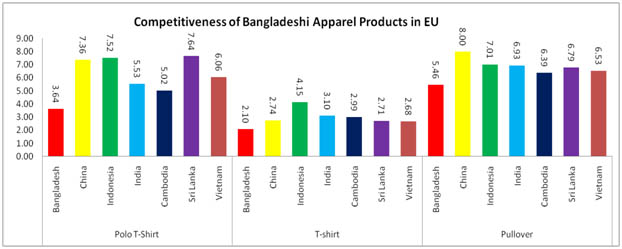Bangladesh demands better prices for garment items

Bangladesh sought better prices for its export items, especially garments, from the US retailers and brands in the fourth round of Ticfa meeting held in Washington on Thursday.
In the event of the Trade and Investment Forum Agreement (Ticfa), Bangladesh also demanded duty privilege for all the products of its export basket to the American markets.
Bangladeshi garment makers have been remediating the factories as per the recommendations of the Accord and Alliance—building inspection and remediation agencies—which will cost them nearly $3 billion.
The tenure of both the western agencies will end in December this year.
But the western buyers still do not want to raise the prices a bit in an excuse of a fall in demand for apparel items in their countries, including the US, the commerce ministry said in a statement.
In the meeting, Bangladesh also sought increased investment from the US, according to the statement.
Bangladesh also reminded US of the Bali declaration of the World Trade Organisation in 2013, when the developed nations agreed to give duty waiver to the goods of least developed countries.
In Bali, they also gave word to offer duty benefits to 97 percent of the goods originated from the LDCs, if duty waiver to all goods is not possible.
Bangladeshi products also enjoy the duty waiver, but the US kept garment items—the main export item of Bangladesh—out of the 97 percent package's list.
Currently, the garment makers have to face a 15.62 percent duty for export to the US.
The overall value of Bangladesh's exports to the US increased 5.83 percent year-on-year to $3.63 billion in the first seven months of this year thanks to higher apparel shipments, US Census Bureau data shows.
In the period, apparel exports to the American markets grew 5.61 percent year-on-year to $3.21 billion and Bangladesh became the third—moving up from the sixth position—highest garment exporter to the US, according to data from the US Office of Textile and Apparel.
Garment items account for over 90 percent of Bangladesh's total export value and the US is its largest garment export destination. In June 2013, the US government suspended Bangladesh's trade privilege—the Generalised System of Preferences—citing poor labour rights and workplace safety.
The trade privileges are yet to be reinstated, although Bangladesh lobbied the US government after improving the labour standards and workplace safety, the commerce ministry said. The US duty free import benefit under the GSP programme is extended only to some LDCs in the Sub Saharan areas under the African Growth and Opportunity Act.
Bangladesh also demanded US cooperation for sustainability of its economy after the country's graduation to the developing country's category. In the Ticfa meeting, the US representatives urged Bangladesh to import more American cotton and improve intellectual property rights.
The US side in the meeting also discussed the procurement policy and labour rights issues of Bangladesh.
The meeting was co-chaired by Shubhashish Bose, commerce secretary, and Mark Linscott, assistant US Trade Representative (USTR) for south and central Asian affairs, according to a statement from the USTR. Earlier, the US and Bangladesh had signed the Ticfa agreement in November 2013 mainly to revive the GSP to the US markets.
